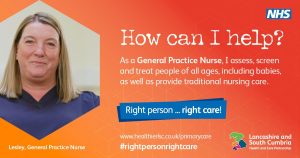Campaign launched to highlight services offered in General Practice
The campaign aims to highlight the wide range of support and advice available to patients in general practice from a range of health professionals, including pharmacists and advanced nurse practitioners.

Research by the NHS in Lancashire and South Cumbria earlier this year showed an overwhelming majority of people are happy to speak to a health professional other than their GP where appropriate, but nearly half of respondents did not understand all services available to them.
Seeing another expert within general practice, where clinically appropriate, can save time by reducing the number of appointments needed to get the right care.
Patients are encouraged to take up an appointment with these professionals if offered one by reception staff, who undertake training to signpost patients to the correct service, or another member of the team.
Dr Lindsey Dickinson, a GP in Chorley and associate medical director for NHS Lancashire and South Cumbria Integrated Care Board (which was established in July to plan and buy health and care services across the region), said: “The offer from general practice is so much more than it used to be ten or even five years ago. We now have an extended team who use their individual expertise to work together and provide specialist, all-round care.
“If patients have shoulder pain, for example, GPs would typically direct to the physiotherapist for assessment, but seeing a physiotherapist as the first port of call can save time and make sure patients get the care they need more quickly.
“Where a typical GP appointment may last around 12 minutes, our other healthcare professionals often have more time to assess, diagnose and treat your condition. We also have social prescribing link workers who are not clinical but spend time getting to know patients on a personal level and direct them to appropriate services in the community.
“Going directly to the most appropriate professional will help your local NHS as we try to tackle the current level of high demand as efficiently as possible.
“Please be assured that you will still be offered an appointment with your GP if this is the most appropriate course of action for you.”
The campaign also explains the role of receptionists, who are trained as care navigators to ensure patients are directed to the most appropriate setting for their healthcare needs.
Dr Dickinson added: “Receptionists are a vital part of the general practice team. Often they are the first port of call for people contacting us and, as well as greeting patients, receptionists will help you get to the right place as quickly as possible.
“To do this, they will ask questions about your condition and/or symptoms. Please do not be offended and treat them with courtesy and respect.
“If you are unsure about the services available to you, many practices will have a list available on their websites or consider asking receptionists when making an appointment.

